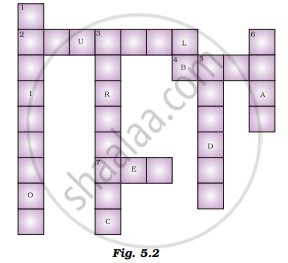Advertisements
Advertisements
Question
How is the neutralisation of a carbonate with an acid different from the neutralisation of an oxide or a hydroxide?
Solution
Metal carbonates react with acids to give a corresponding salt, carbon dioxide and water.
The reaction can be represented as follows:
Metal carbonate + Acid → Salt + Carbon dioxide + Water
Example:
Na2CO3(s) + 2HCl(aq) → 2NaCl(aq) + H2O(l) + CO2(g)
However, the neutralisation of an oxide or a hydroxide with an acid gives only a salt and water.
Metal oxide + Acid → Salt + Water
Example:
Na2O + 2HCl → 2NaCl + H2O
Metal hydroxide + Acid → Salt + Water
Example:
NaOH + HCl → NaCl + H2O
APPEARS IN
RELATED QUESTIONS
Name the source from which litmus solution is obtained. What is the use of this solution?
It has been found that rubbing vinegar on the stung area of the skin of a person gives him relief. The person has been stung by:
(a) wasp
(b) ant
(c) honey bee
(d) nettle leaf hair
Write balanced equation to satisfy the following statement:
\[\ce{Acid + Sulphite or bisulphite -> Salt + water + sulphur dioxide}\]
Write chemical names from given formulae.
H2SO4
The label on the bottle of chemical is spoiled. How will you find whether the chemical is acidic or not?
Give the name and formula of two : Non-volatile acids
Name the positive ion formed When an acid is dissolved in water.
Fill in the crossword given in Figure 5.2 with the help of the clues provided.

Across
(2) The solution which does not change the colour of either red or blue litmus.
(4) Phenolphthalein gives pink colour in this type of solution.
(7) Colour of blue litmus in lemon juice.
Down
(1) It is used to test whether a substance is acidic or basic.
(3) It is a natural indicator and gives pink colour to the basic solution.
(5) Nature of ant’s sting.
(6) It is responsible for the increase in temperature during a neutralisation reaction.
Curd contains ______ acid.
Complete the following equation.
HCl + ______ → NaCl + H2O
